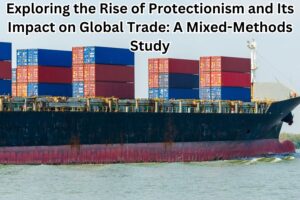Description
Exploring the Impact of Brexit on European Union Trade Policies: A Mixed-Methods Analysis
Abstract
Brexit has regulatory frameworks, fundamentally reshaped trade policies of the European Union, market access, and influencing economic relationships. The departure of the UK introduces customs regulations, policy shifts, and new trade barriers. It requires EU to successfully adopt the trade strategies. All these changes are showing the effect on the businesses, economic stability, and supply chains in Europe. Basically a proper understanding of Brexit’s impact on the trade policies of the EU is important for assessing economic resilience and future trade developments.
The study analyses the Brexit impact with the help of a mixed-methods approach. It successfully integrates the quantitative trade data analysis with qualitative insights from business leaders, economists, and policymakers. However the research explores the way Brexit shows the impact on the tariff structures, regulatory standards, and EU trade agreements. In the study, the key areas of focus include the continuous shifts in the trade deals of renegotiation with the non-EU countries. The study also assesses the challenges faced by the businesses, like supply chain disruptions, market uncertainties, and increased costs. Most attention is given to the most affected industries, including agriculture, financial, and manufacturing services.
Findings show that Brexit drove the EU to improve its economic ties with its global partners while the trade complexities navigated with the UK. The regulatory reforms, strategic policy adjustments, and new trade agreements aim to control the disruptions and encourage economic stability. Besides the ongoing challenges, the EU is refining its trade strategies continuously for post-Brexit trade relations optimization. Moreover along with creating stronger international collaborations, and analyzing the flexible trade policies requirement. These insights offer valuable guidance for businesses and policymakers who seek to successfully adopt the continuously evolving trade landscape. Finally, a proper understanding of the developments is important for ensuring stability and economic growth in the post-Brexit era.
Read more about the topic
How did the Brexit uncertainty impact services exports of UK firms?
View Other Projects on Brexit








Reviews
There are no reviews yet.